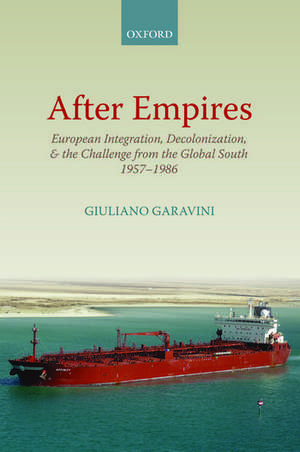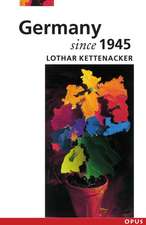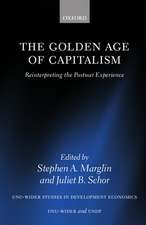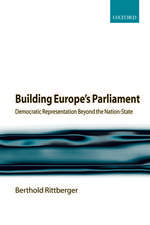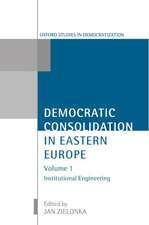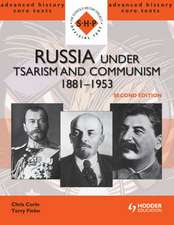After Empires: European Integration, Decolonization, and the Challenge from the Global South 1957-1986: Oxford Studies in Modern European History
Autor Giuliano Garavini, Translated by Richard R. Nybakkenen Limba Engleză Hardback – 25 oct 2012
Din seria Oxford Studies in Modern European History
- 30%
 Preț: 673.53 lei
Preț: 673.53 lei - 13%
 Preț: 278.29 lei
Preț: 278.29 lei -
 Preț: 222.12 lei
Preț: 222.12 lei - 26%
 Preț: 601.69 lei
Preț: 601.69 lei - 6%
 Preț: 234.19 lei
Preț: 234.19 lei - 16%
 Preț: 707.37 lei
Preț: 707.37 lei - 25%
 Preț: 522.10 lei
Preț: 522.10 lei - 17%
 Preț: 582.53 lei
Preț: 582.53 lei - 17%
 Preț: 583.54 lei
Preț: 583.54 lei - 16%
 Preț: 584.33 lei
Preț: 584.33 lei - 25%
 Preț: 582.12 lei
Preț: 582.12 lei - 30%
 Preț: 623.22 lei
Preț: 623.22 lei - 30%
 Preț: 486.56 lei
Preț: 486.56 lei - 14%
 Preț: 321.01 lei
Preț: 321.01 lei -
 Preț: 341.60 lei
Preț: 341.60 lei - 27%
 Preț: 832.43 lei
Preț: 832.43 lei -
 Preț: 309.69 lei
Preț: 309.69 lei - 30%
 Preț: 729.14 lei
Preț: 729.14 lei - 12%
 Preț: 351.71 lei
Preț: 351.71 lei - 14%
 Preț: 297.87 lei
Preț: 297.87 lei - 14%
 Preț: 295.23 lei
Preț: 295.23 lei - 13%
 Preț: 240.04 lei
Preț: 240.04 lei - 30%
 Preț: 671.46 lei
Preț: 671.46 lei - 30%
 Preț: 613.37 lei
Preț: 613.37 lei - 27%
 Preț: 662.35 lei
Preț: 662.35 lei - 17%
 Preț: 582.46 lei
Preț: 582.46 lei - 17%
 Preț: 581.77 lei
Preț: 581.77 lei - 16%
 Preț: 584.42 lei
Preț: 584.42 lei - 30%
 Preț: 506.30 lei
Preț: 506.30 lei
Preț: 877.94 lei
Preț vechi: 1177.64 lei
-25% Nou
Puncte Express: 1317
Preț estimativ în valută:
167.100€ • 179.64$ • 140.07£
167.100€ • 179.64$ • 140.07£
Carte tipărită la comandă
Livrare economică 07-14 aprilie
Preluare comenzi: 021 569.72.76
Specificații
ISBN-13: 9780199659197
ISBN-10: 0199659192
Pagini: 304
Ilustrații: Two black and white maps
Dimensiuni: 162 x 240 x 22 mm
Greutate: 0.62 kg
Editura: OUP OXFORD
Colecția OUP Oxford
Seria Oxford Studies in Modern European History
Locul publicării:Oxford, United Kingdom
ISBN-10: 0199659192
Pagini: 304
Ilustrații: Two black and white maps
Dimensiuni: 162 x 240 x 22 mm
Greutate: 0.62 kg
Editura: OUP OXFORD
Colecția OUP Oxford
Seria Oxford Studies in Modern European History
Locul publicării:Oxford, United Kingdom
Recenzii
Offers a refreshing account of an organization that has managed to adapt to radically.
Based on extensive multilingual research, including sources that were previously inaccessible to historians, this book is the best history of the Organization of the Petroleum Exporting Countries (OPEC) yet published.
A well-needed and important contribution to the growing body of literature on the history of oil and energy that aims to transcend the confines of an American and European perspective
It is rare to see a book on oil history that takes on the challenge of developing a truly global analysis while at the same time going into local depth when it comes to the oil histories of individual countries
Garavini suggests that OPEC can still play a valuable example for other raw materials producers even in a post-hydrocarbon age and that it can play a valuable role in the fight against climate change by serving as a carbon tax "collector" and preventing any price collapses
The sweeping analysis merits extended citation because it exemplifies the breakneck pace, learned insight, and wide range that will make After Empires a touchstone in the histories of decolonization and globalization.
After Empires: European Integration, Decolonization and the Challenge from the Global South (1957 - 1986) is a thoroughly researched, lucidly written and highly original argument about the complex links between decolonization, post World War II debates about development, and the ideas about the process of European integration.
The book has the merit of analyzing the influence of different actors: individuals, social movements and political parties. It will be a fundamental historical framework for all of those who are interested in the external policies of the European Community (EU).
Based on extensive multilingual research, including sources that were previously inaccessible to historians, this book is the best history of the Organization of the Petroleum Exporting Countries (OPEC) yet published.
A well-needed and important contribution to the growing body of literature on the history of oil and energy that aims to transcend the confines of an American and European perspective
It is rare to see a book on oil history that takes on the challenge of developing a truly global analysis while at the same time going into local depth when it comes to the oil histories of individual countries
Garavini suggests that OPEC can still play a valuable example for other raw materials producers even in a post-hydrocarbon age and that it can play a valuable role in the fight against climate change by serving as a carbon tax "collector" and preventing any price collapses
The sweeping analysis merits extended citation because it exemplifies the breakneck pace, learned insight, and wide range that will make After Empires a touchstone in the histories of decolonization and globalization.
After Empires: European Integration, Decolonization and the Challenge from the Global South (1957 - 1986) is a thoroughly researched, lucidly written and highly original argument about the complex links between decolonization, post World War II debates about development, and the ideas about the process of European integration.
The book has the merit of analyzing the influence of different actors: individuals, social movements and political parties. It will be a fundamental historical framework for all of those who are interested in the external policies of the European Community (EU).
Notă biografică
Giuliano Garavini obtained a degree from the College of Europe in Bruges and holds a PhD in International History from the University of Florence. He is currently working on global history of the "oil shocks" in the 1970s and is coordinating a large research project on this topic.
